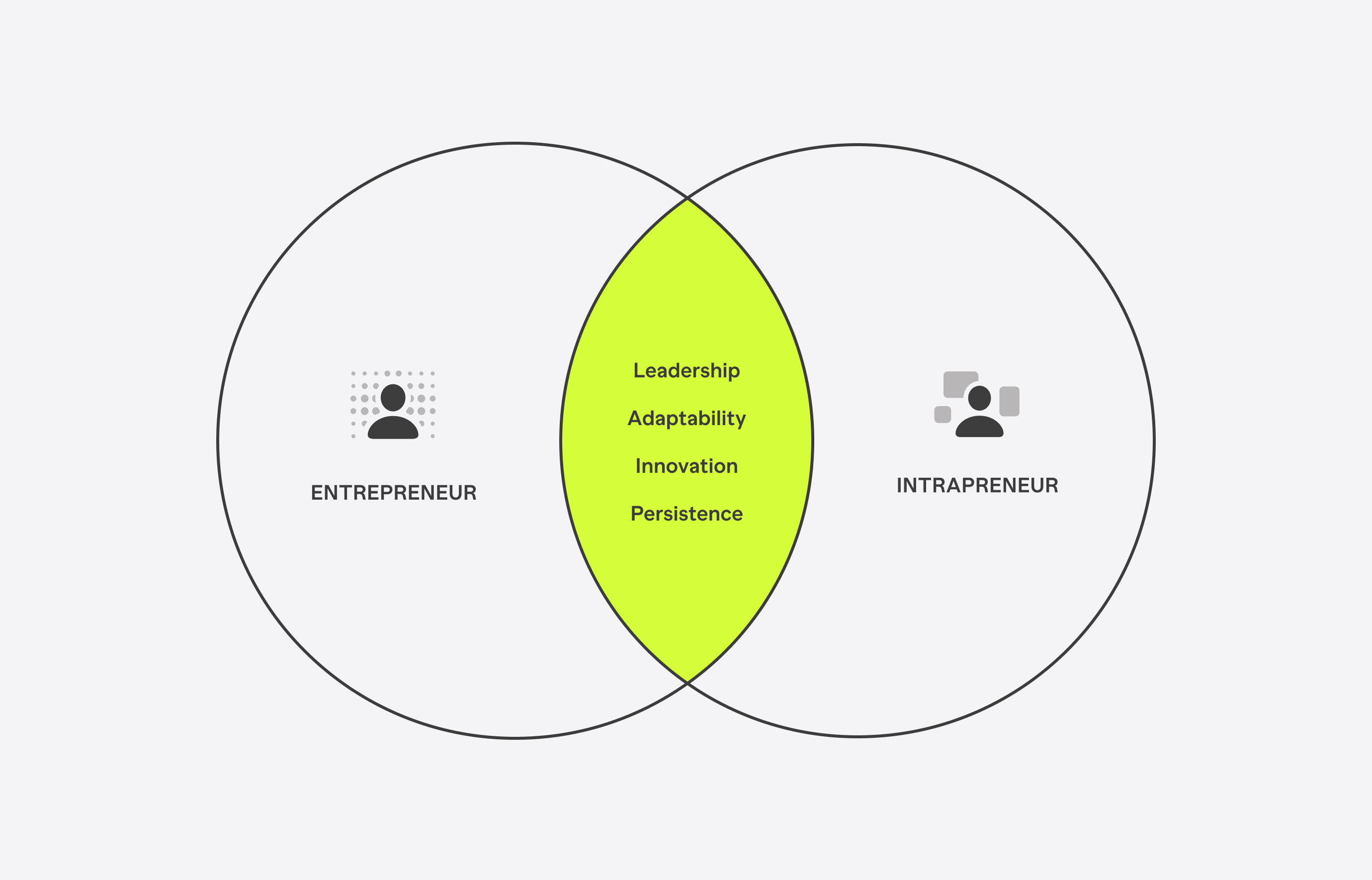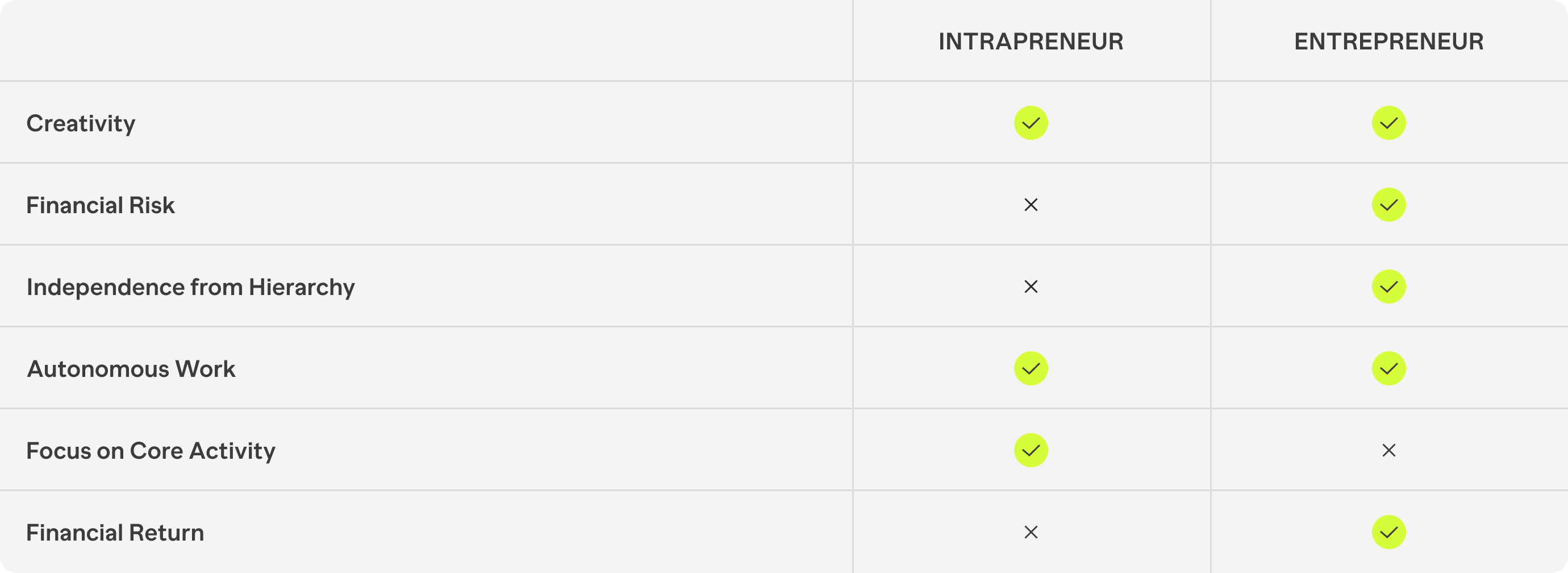What is an Entrepreneur?
An entrepreneur transforms business ideas into reality with vision and determination. They shape their own career path and guide the strategic direction of their ventures. Entrepreneurs are constantly developing innovative business plans and ideas. While they may face challenges due to limited resources, their resilience and creativity lead to groundbreaking achievements in entrepreneurship.
What is an Intrapreneur?
An intrapreneur acts within an existing company. They apply entrepreneurial skills to develop innovative ideas that drive internal innovation. As part of a leadership team, they often enjoy the resources and support of an established company. Unlike entrepreneurs, intrapreneurs don’t own the business but they contribute to the business's growth by taking on risky projects that can lead to new ventures. Their role is essential in keeping the company competitive and relevant in the market.
Entrepreneurs and Intrapreneurs: A Shared Drive for Innovation
Both entrepreneurs and intrapreneurs are driven to make their mark, whether as their own boss or within established companies. They share a goal of seeing new business ideas come to life.
- Innovation and Ideas:
- Both excel at innovating.
- Both come up with the ideas that kick off new business ventures.
- Leadership and Planning:
- They guide their teams using strong leadership skills.
- Entrepreneurship and entrepreneurship both require detailed business plans.
- Risk and Reward:
- Risk-taking is a common trait — entrepreneurs with their own resources and intrapreneurs with the company's.
- Goals and Growth:
- Whether for a small business or a new department, entrepreneurs and intrapreneurs are both focused on growth.
- Communication and Teamwork:
- Strong communication skills are required for conveying their visions and getting positive feedback.
- They often need to hire employees to help bring their business concepts to life.
- Company Dynamics:
- An understanding of company politics is required to successfully bring their plans forward.

The Key Differences Between Entrepreneurs and Intrapreneurs
Entrepreneurship and intrapreneurship each have unique challenges and rewards.
- Freedom vs. Structure:
- Entrepreneurs enjoy complete freedom to pursue their new ideas. Intrapreneurs must work within the structures of an existing organization.
- Entrepreneurs can start any new venture they dream up, while intrapreneurs have to align their goals with the company's.
- Resources and Support:
- Entrepreneurs often start with fewer resources and have to find potential customers on their own.
- Intrapreneurs usually have the company's resources to develop their new ideas.
- Risk and Responsibility:
- Entrepreneurs bear all the risks — and get all the credit — when their businesses succeed.
- Intrapreneurs share these risks and successes with the company.
- Reputation and Career:
- An entrepreneur’s reputation grows with their business’s success.
- For intrapreneurs, their career can advance within the company if they successfully bring new ideas to the market.

Entrepreneurship Pros and Cons
Many people dream of entrepreneurship, but it's not a one-way street to success. Here’s a quick look at the good and bad of starting your own business.
Pros:
- Freedom to Create: Entrepreneurs have the freedom to bring their ideas to life. They make the final decision on everything from the business plan to the brand logo.
- Being the Boss: Running your own company means you get to be the boss.
- Potential for Growth: There's no cap on success for an entrepreneur. You never know when a business idea will take off.
- Personal Satisfaction: Building something from scratch is fulfilling. It’s a powerful motivator for many entrepreneurs.
Cons:
- Financial Risk: Starting a new venture is expensive. Entrepreneurs often invest their own money or take on significant debt to launch a business.
- Uncertainty and Pressure: The weight of the company's success or failure is on the entrepreneur who started it. This pressure can lead to stress and uncertainty.
- Work-Life Balance Challenges: Many entrepreneurs find it difficult to separate work from personal life, resulting in long hours that lead to burnout.
- Full Responsibility: When an issue arises, it’s up to the entrepreneur to address it. From troubleshooting to customer service, they are essential to every part of the business.
Intrapreneurship Pros and Cons
Just like entrepreneurship, intrapreneurship has its own set of benefits and drawbacks. Intrapreneurs might work within the structure of an existing company, but they still experience many of the thrills and challenges that come with innovation and leadership.
Pros:
- Support and Stability: Intrapreneurs have the backing of their company. This gives them a stable platform and the resources they need to develop new ideas or strategies.
- Room to Innovate: Many companies encourage intrapreneurship. That means employees get to act like entrepreneurs while still having the security of a regular job.
- Professional Growth: Being an intrapreneur shows initiative and the ability to innovate within an existing organization, boosting your professional reputation.
Cons:
- Limited Autonomy: An intrapreneur has less freedom to pursue their ideas. They need to align with the company's goals and policies.
- Company Politics: Navigating company politics can be a chore for intrapreneurs. Stakeholder buy-in is required to successfully bring new concepts to life.
- Resource Constraints: Even within a company, resources for new ventures might be limited, especially if the project isn't immediately profitable.
Book a call with our Program Director
Book a 15-minute call with our Program Director to discuss your goals and what the Augment MBA has to offer.
Speak to an advisorEntrepreneurship Example
Imagine someone named Alex who has a passion for gardening and technology. Alex notices that many people want to start home gardens but often struggle with plant care. Spotting a market opportunity, he decides to start a new business.
- Innovation Meets Demand:
Alex develops a smart gardening system that makes it easy for anyone to grow plants at home. The system includes automated watering, nutrient delivery, and even artificial intelligence to monitor plant health.
- Business Plan and Development:
He drafts a business plan that outlines the target market, funding requirements, product development, and marketing strategies.
- Launching the Startup:
With some initial investment, Alex sets up a small business called "GrowEasy." The product quickly gains traction because it offers a new idea that simplifies home gardening.
- Building the Brand:
He uses social media and gardening forums to share successful home gardening stories using "GrowEasy."
- Ownership of Success:
As the business grows, Alex takes on the role of CEO and becomes the face of the brand. Unlike an intrapreneur, Alex gets to steer the company and receives complete credit for its success.
Intrapreneurship Example
Jordan is a creative vice president at a large tech company, TechAdvance. She is a successful intrapreneur known for developing innovative ideas within the organization.
- Innovation from the Inside:
Jordan notices that the company's software could be smarter and more intuitive. Seeing the trend in artificial intelligence, she proposes an AI integration that could revolutionize the company's product offerings.
- Pitching the Idea:
With a solid plan in place, she pitches the new concept to the company leaders, highlighting how this could push TechAdvance ahead of competitors.
- Green Light for the Project:
The company recognizes the potential and gives her the go-ahead. Unlike an entrepreneur, Jordan doesn't have to worry about acquiring capital or resources — the company provides it all.
- Leading a Team:
As a trusted intrapreneur, Jordan assembles a team of skilled individuals within the company. They work together to develop the AI project, using existing company channels and resources.
- Launch and Success:
The project is a success and soon becomes a critical element of TechAdvance's product lineup. It's even featured in tech news articles as a groundbreaking development.
- Recognition and Growth:
Although Jordan doesn't own the project like an entrepreneur would, the success boosts her professional reputation within the company, and her role in the company grows.



